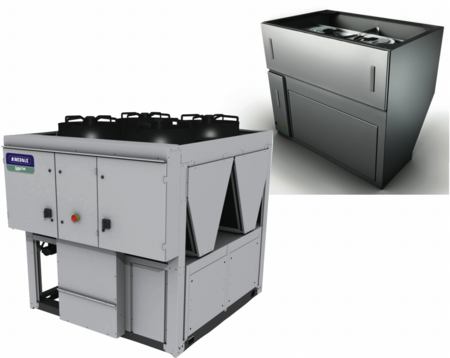Airedale introduces low-energy approaches to data-centre cooling
Among a range of new cooling solutions from Airedale is an R410A chiller with a cooling capacity from 150 to 450 kW and which can achieve up to 98% free cooling, based on London conditions. The DeltaChill Freecool (left) combines the latest fan technology with micro-channel coils to achieve an ESEER (European seasonal EER) above 4.5.
The other cooling solutions are for data centres.
The 60 kW InRak cooling system is designed to fit in between server racks and includes a direct-expansion/chilled-water dual-cooling option. When integrated with the DeltaChill FreeCool chiller or the BluCube condensing unit (see below), very high efficiencies can be obtained.
The OnRak rear-door heat exchanger adds only 200 mm to the depth of the rack and can provide 3 to 33 kW of cooling. This system has an EER of up to 166. Over a year, it can achieve energy savings of up to 88% compared with a traditional airside unit of the same capacity.

The ACE (Active Cabinet Exhaust) unit is installed on top of the server cabinet with no loss of floor space (top of story). Its twin EC fans (N+1) provide up to 18 kW of cooling by removing hot air and ducting it directly to an Airedale CRAC unit linked to free-cooling chillers.
The BluCube is a cost-effective R410A condensing unit with heat-pump variant and variable capacity control. It can be matched to a variety of industry-standard air-handling units and also be integrated with InRack or SmartCool.







